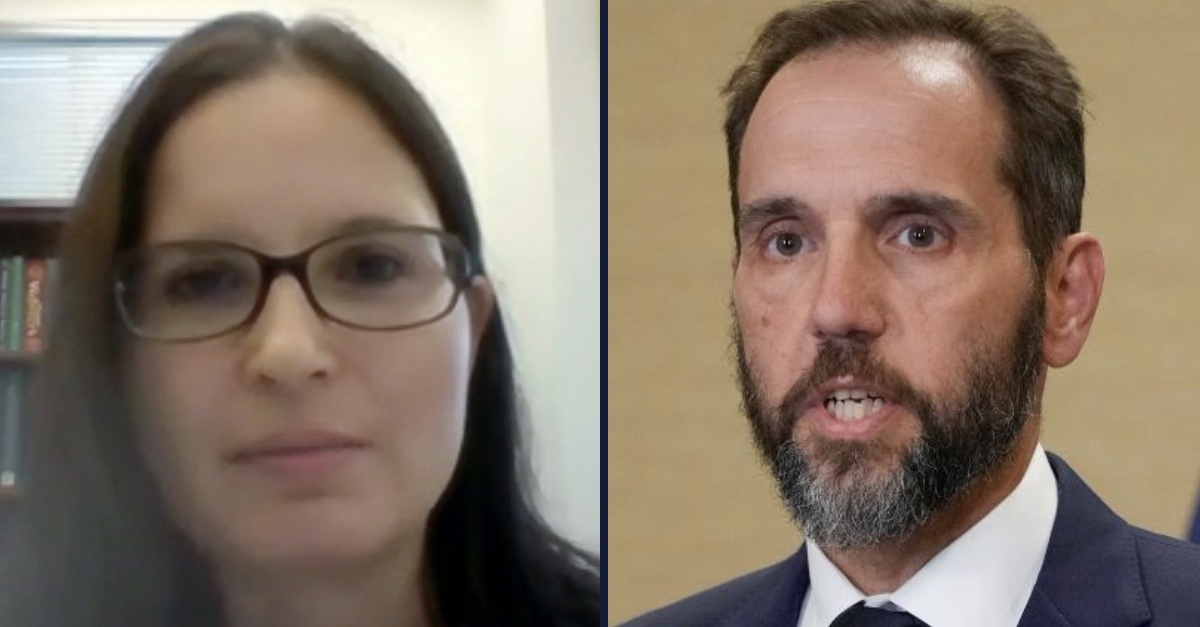
Judge Aileen Cannon (left) during a Senate Judiciary Committee oversight nomination hearing on July 29, 2020 (U.S. Senate via AP). Special counsel Jack Smith (right) speaks about an indictment of former President Donald Trump, Aug. 1, 2023, at a Department of Justice office in Washington. (AP Photo/Jacquelyn Martin)
Donald Trump scored a legal win in Florida when a federal judge appointed by him rejected special prosecutor Jack Smith’s effort to force the former president to reveal a part of his legal strategy.
In November, Smith filed a motion asking U.S. District Judge Aileen Cannon to order Trump to tell prosecutors whether he intends to use an “advice-of-counsel” defense against allegations he improperly retained and stored classified documents.
According to Smith’s June 2023 indictment, classified documents were kept at various places at Trump’s Mar-a-Lago club, including in a bathroom, a shower, and the former president’s bedroom. At one point, Trump is alleged to have showed off the documents in July 2021 at his golf club in New Jersey.
As Smith noted in his November motion seeking the disclosure, Trump has signaled that he intends to say he was just following legal advice at the time.
“He has publicly stated he was ‘told’ he had no legal obligation to return classified documents to the Government or presidential records to the National Archives and Records Administration (‘NARA’), thereby indicating a possible defense of good faith reliance on advice of counsel,” Smith wrote in the filing. Smith provided other examples, including a nonspecific reference to having been told he was “under no obligation” to hand over certain materials “based on various legal rulings that have been made over the years.”
As recently as September, Smith noted, Trump said: “I’m allowed to have these documents, I’m allowed to take these documents, classified or not classified . . . . I’m covered by the Presidential Records Act. I’m allowed to do what I want to do. I’m allowed to have documents.”
“All of these examples raise the possibility that defendant Trump will assert an advice-of-counsel defense at trial, necessitating the notice and discovery the Government seeks here,” Smith wrote.
Cannon, who was appointed in November 2020 during the waning days of the former president’s term, disagreed.
On Friday, in a paperless order posted to the federal docket, the judge indicated that it’s too soon to require defense attorneys to tell the prosecution of their plans.
“Assuming the facts and circumstances in this case warrant an order compelling disclosure of an advice-of-counsel trial defense, the Court determines that such a request is not amenable to proper consideration at this juncture, prior to at least partial resolution of pre-trial motions, transmission to Defendants of the Special Counsel’s exhibit and witness lists, and other disclosures as may become necessary,” Cannon’s order says. “The Special Counsel’s Motion 208 is therefore denied without prejudice.”
The “without prejudice” ruling means that Smith can raise the issue down the line. Notably, however, Trump has been ordered to tell Smith by Monday whether he intends to rely on an advice-of-counsel defense in his election subversion criminal case in Washington, D.C.
Cannon’s decision to essentially grant Trump a reprieve from sharing strategy comes after her December order to unseal several documents, despite Smith’s concerns about revealing the “contours and extent” of the government’s plans to delete classified information from discovery materials.
Also Friday, Cannon — who has previously dinged Smith over his “unauthorized” wordy filings — granted a defense request to file an “oversized consolidated brief” in support of upcoming discovery motions.
“Defendants may file one consolidated classified brief and one consolidated unclassified brief, neither to exceed 120 double-spaced pages using 12-point font,” Cannon’s order specified. “The Special Counsel is granted corresponding relief for its combined responses.”
Have a tip we should know? [email protected]

